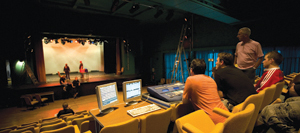Tony Gibbs sees the beginnings of a new way of thinking about amateur theatre which will make it more sustainable.

Ask anyone involved in amateur or professional theatre to define their three main priorities, and the chances are they will say attracting an audience, encouraging more young people to get involved, and financial sustainability. The recession brings these issues into sharper focus, but they are not new. There are a number of emerging topics which reinforce the need for all of us involved in theatre to think – and to behave – differently. The traditional lines between what is perceived as professional, amateur or community theatre are not helpful.
Initiatives over the past year have demonstrated that some of us are starting to think differently. Tim Rice and Andrew Lloyd Webber released ‘The Likes of Us’ to the amateur market prior to a professional release, which is the inverse of the traditional licensing model for rights holders. This has enabled amateur societies to develop new marketing and promotional tools that have resulted in full houses, as well as creating opportunities to work with other organisations. The different groups will come together later this year when the Royal Shakespeare Company hosts sessions to consider how voluntary arts practitioners can work alongside the professionals in the Cultural Olympiad. The seeds are being sown to encourage more cross-sector collaboration. Central and local government increasingly recognise the contribution that amateur and community theatre make to communities, and people’s involvement on a voluntary basis is key to success.
What practical steps can theatre practitioners take to support each other in addressing these three priorities? First and foremost, every theatre wants an audience for all productions throughout the year. It’s not simply about promoting one night out as being better than the rest. Let us encourage theatre owners and managers to adopt a more collaborative approach in their marketing, and to seek out ways to work with producers who can share expertise with each other to encourage audiences to buy tickets to as many productions as possible at the same theatre. Secondly, it is worth reminding parents and schools that young people can learn and develop many transferable skills by joining a local amateur theatre society. Building self-confidence, presentation skills and team-work are all part of voluntary arts, and can lead to work on stage, back stage or front of house. Business skills can be learnt by working on a theatrical production, which can have benefits in a future career. Maybe the message to young people needs to be a bit more refined, and amateur dramatic societies should highlight the wider transferable skills that can be developed by getting involved at the local theatre.
How does this all contribute to financial sustainability? As the National Operatic and Dramatic Association is reminding its members, it is important to recognise that theatre and other performing arts increasingly rely on sound commercial practices to ensure financial success. Box office receipts are not achieved by accident – it takes financial planning linked to effective marketing and an understanding of budgetary practices to ensure success, often with the focus not just on the next production, but on opportunities to generate income throughout the year. The time is ripe to seek new ways of working and in particular to assess cross-sector commercial opportunities. If all of us involved in theatre move beyond the traditional boundaries, then the future does not have to be threatening. It can represent new ways of working and new horizons which we can all aspire to reach.
Tony Gibbs is Chief Executive of the National Operatic and Dramatic Association. w: http://www.noda.org.uk



